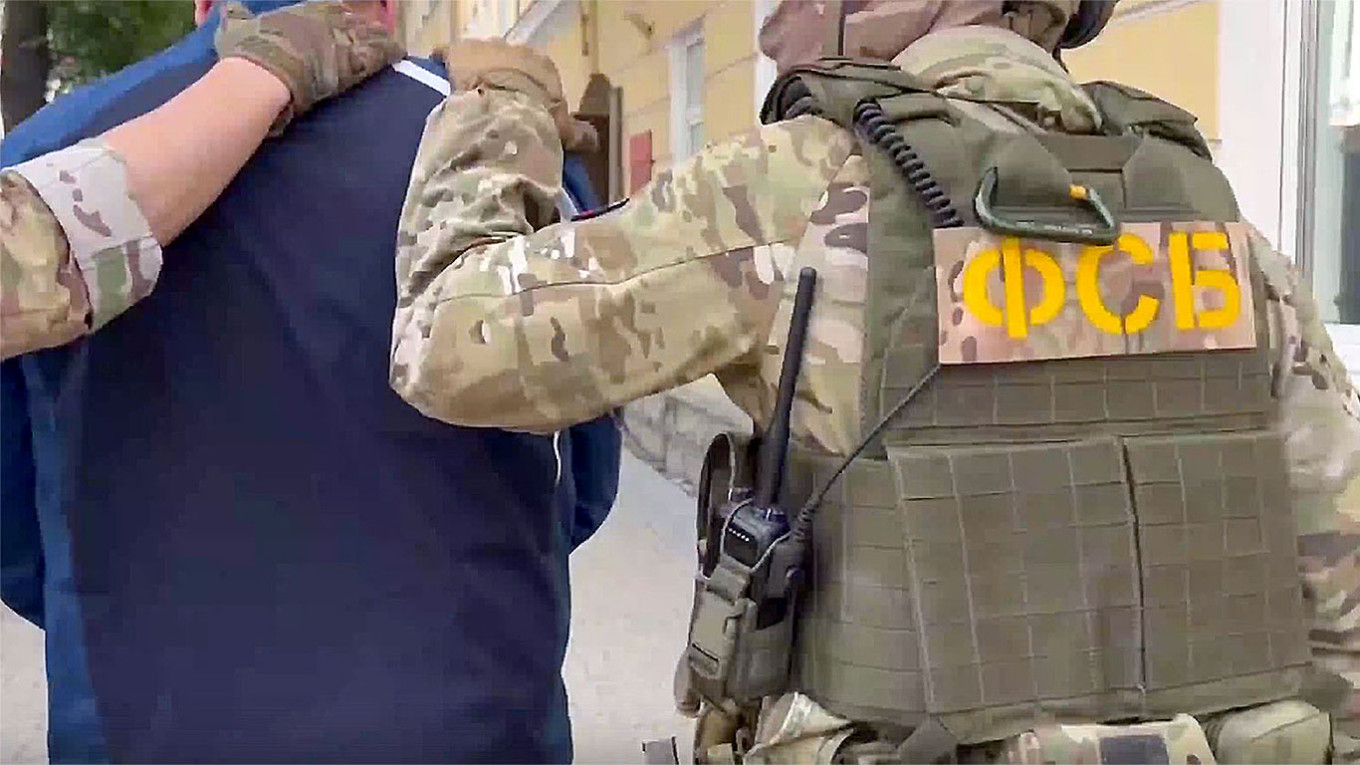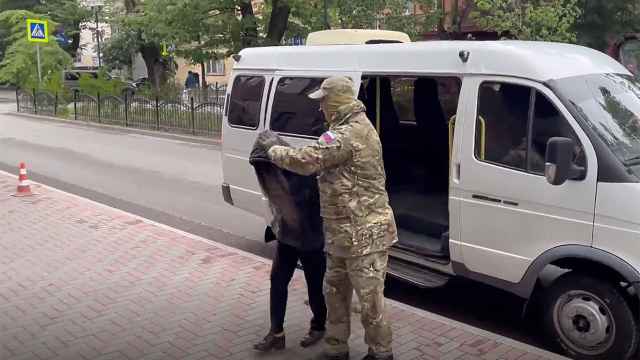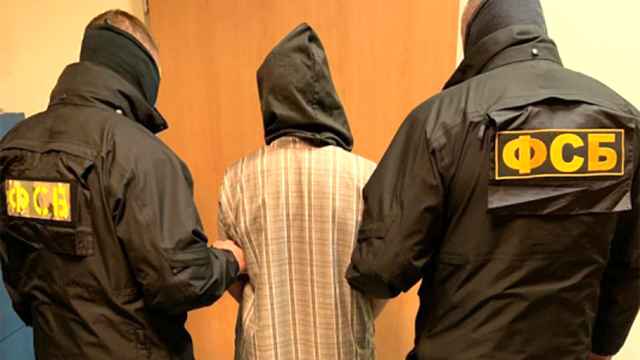Russian law enforcement and security services have regularly reported investigations, detentions and arrests of Russian citizens suspected of financially supporting Ukraine's army since March. Over the past month, however, such announcements have become increasingly frequent.
Little is known about the veracity of such cases, which are prosecuted as treason and punishable by up to life in prison.
Experts say the Federal Security Service (FSB) is likely publicizing these cases to warn ordinary Russians against showing any form of support for Ukraine or opposition to the war.
The Moscow Times examines Russia’s latest pursuit to fight treason by detaining ordinary citizens:
What has been happening?
On July 5, a Russian citizen born in Ukraine was detained at the Yekaterinburg airport on accusations of financing the Ukrainian army. According to the FSB, the man transferred money to a bank account that raised funds for the Ukrainian Armed Forces.
On June 21, a resident of the Far Eastern Khabarovsk region was detained on suspicion of financing the Armed Forces of Ukraine. According to the FSB, the man used cryptocurrency to transfer funds to a foreign charity through third parties who live in Ukraine.
On June 14, a Russian Railways (RZhD) train operator was arrested in the Far Eastern Amur region under suspicion of transferring money for the use of the Ukrainian army between September 2022 and January 2023.
Previously, the FSB detained a resident of Khabarovsk, a man from St. Petersburg, a political activist from Khabarovsk and a Moscow resident, accusing them all of financially supporting the Ukrainian Armed Forces.
Public figures who privately or publicly oppose the war also run the risk of being inspected for donating to the Armed Forces of Ukraine.
The Moscow prosecutor's office has opened a probe into Georgian-Russian singer Valery Meladze to search for evidence of sending funds to Ukraine's army. A denunciation against Russian pop icon Alla Pugacheva, who has spoken out against the war, asked authorities to inspect her finances for the same reason. Russian social media influencers are increasingly likely to be checked for financial support of banned organizations, attorney Alexander Kabanov warned.
What are the stakes?
Those arrested are being charged with treason, which is punishable by 12 to 20 years of imprisonment. On April 28, President Vladimir Putin signed amendments to the Criminal Code which increased the maximum punishment for treason to life imprisonment.
Human rights activists note that the number of criminal cases opened under the article on treason has increased dramatically since the start of the Russian offensive in Ukraine. In 2022, 22 cases were opened, already a record in recent history — and so far this year, this number was already reached by June.
“It speaks to the fragility of the regime that they have had to make these kinds of changes,” Doug Klain, an expert on authoritarianism in Russia at the Atlantic Council’s Eurasia Center, told The Moscow Times. “Broadening out the ability to use treason as charges against people it’s a sign that the Russian government is trying to expand its toolbox for keeping people under control, to reduce the chance of domestic instability as it continues to wage its war against Ukraine.”
Are the cases legitimate or staged?
The string of treason accusations is a political trend, and Russian officials are known for staging political charges, such as the treason case against opposition politician Vladimir Kara-Murza.
“All these high-profile, big articles, like treason, they are generally primarily about politics: not in order to imprison a specific person, but in order to effectively intimidate the population, discourage them from doing some things,” said attorney Yevgeny Smirnov from the Perviy Otdel human rights association, which specializes in cases under investigation by the FSB.
However, Perviy Otdel’s data from the early months of the war in Ukraine show that the FSB does have a system to track Russians who transfer money to accounts that raise funds for the Ukrainian army.
According to Smirnov, many Russians donated money to support Ukraine at the start of the offensive in February 2022. The Prosecutor General's Office soon issued a public warning that such support could be regarded as treason. The FSB then started to target those who made transfers in the early days of the offensive, and Perviy Otdel has evidence of at least five cases over the summer.
“With a good number of these cases, it is likely that they are legitimately going after people who actually have supported Ukraine or Ukrainians,” Klain said. “I don’t think that everything is going to be made up here.”
What is the FSB's "message" by publicizing these cases?
Since the start of the Russian offensive in Ukraine, repressions for anti-war statements and actions have been fairly systematic. The recent string of treason cases is similar to the early days of the offensive, when the authorities went out of their way to publicize cases of “traitors” being caught.
“Russia is really trying to send a message to its citizens that there are clear lines no one should even come up to. No one should be speaking out against the war, no one should be showing support for Ukraine, and people should stay away from any kind of political activism as possible,” said Klain. “Russia is trying to hold these people up as symbols of what could happen to you if you go anywhere near opposition to the war.”
Still, it is hard to say why the Kremlin is raising the stakes from the more commonly used charges for cracking down on anti-war dissent — charges of spreading "fakes" about the Russian military and "discrediting" the military, which carry a maximum of 15 years of imprisonment — to charges of treason and life sentences.
“The FSB and the Russian government just want Russians to think that they could get you no matter what. That’s the same tactic that the FSB, KGB and NKVD have been using for decades to make Russians think that they are omnipotent, that they are everywhere and know everything,” Klain said.
A Message from The Moscow Times:
Dear readers,
We are facing unprecedented challenges. Russia's Prosecutor General's Office has designated The Moscow Times as an "undesirable" organization, criminalizing our work and putting our staff at risk of prosecution. This follows our earlier unjust labeling as a "foreign agent."
These actions are direct attempts to silence independent journalism in Russia. The authorities claim our work "discredits the decisions of the Russian leadership." We see things differently: we strive to provide accurate, unbiased reporting on Russia.
We, the journalists of The Moscow Times, refuse to be silenced. But to continue our work, we need your help.
Your support, no matter how small, makes a world of difference. If you can, please support us monthly starting from just $2. It's quick to set up, and every contribution makes a significant impact.
By supporting The Moscow Times, you're defending open, independent journalism in the face of repression. Thank you for standing with us.
Remind me later.







